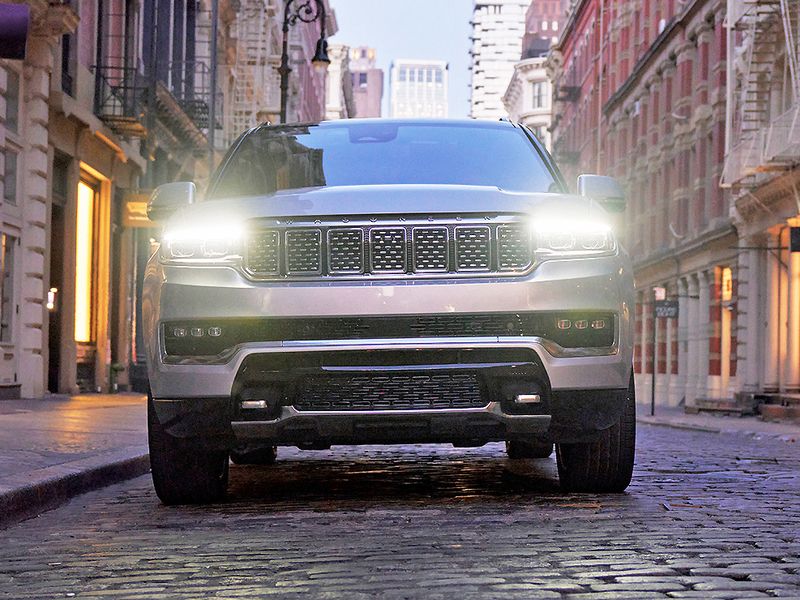
DETROIT — With the help of about 15,000 tablets, Stellantis has created a customer experience road map that is encouraging dealerships to focus on satisfaction more than just sales volumes.
Salespeople use the tablets to go through a checklist to ensure a smooth delivery. For a Jeep Wrangler 4xe plug-in hybrid, the list asks whether the vehicle was charged before leaving the dealership and whether the customer was shown various tech features. The VIN-specific lists change depending on the product, and the customer signs off on them afterward to confirm the store covered everything.
The tablets were delivered to Stellantis dealerships — about six per store — starting in March.
“The dealers bought in to it pretty quickly,” Jeff Kommor, the automaker’s head of U.S. sales, told Automotive News. “They committed to the tablet usage, one for every salesperson.”
The effort is part of a larger push by Stellantis CEO Carlos Tavares to address the sales experience at dealerships, which had been a weak point for Fiat Chrysler Automobiles before the January merger with PSA Group. Tavares told Automotive News in January that if the company can’t make customers happy with its products and service, “we do not deserve to exist.”
FCA struggled through the years on J.D. Power’s U.S. Sales Satisfaction Index Study, which gauges the new-vehicle purchase experience. But the fortunes of several of its brands, now under Stellantis, rose in the latest index, released this month. Dodge leaped into the top five, and Jeep rated above average for mass-market brands. Alfa Romeo scored above average among luxury brands after finishing second to last in 2020. And Ram — though still below average — improved 14 points on the mass-market side.
Kommor credited the quick rollout of the tablet checklists for helping to satisfy customers. He also cited stores following up with buyers after delivery and taking the time to explain vehicle technology as factors.
Stellantis is setting itself up for continued progress, with initiatives such as the training of certified Jeep Wagoneer and Grand Wagoneer ambassadors; the creation of an elite network of Dodge Power Brokers dealerships that meet higher standards for customer service and comprehensive product knowledge; and the steady rollout of Jeep-focused showrooms as well as some standalone Jeep stores.
The J.D. Power study was based on responses from people who bought or leased a new vehicle in the spring, just as the tablet initiative was beginning. It also measured satisfaction with brands and dealerships that customers shopped but ultimately rejected.
J.D. Power said its buyer satisfaction scores have six components: delivery process, dealer personnel, working out the deal, paperwork completion, dealership facility and dealership website.
“I think what’s impressive about the Stellantis brand improvement is underneath those categories, there are these [key performance indicators], or diagnostics, that drive the score, and they were able to improve all of those,” said Chris Sutton, vice president of automotive retail at J.D. Power.
There’s been a culture shift at Stellantis, said Dave Kelleher, the automaker’s dealer council chairman. Incentive money that was once contingent solely on hitting volume goals, Kelleher said, now is doled out based on customer experience.
Kelleher, president of David Dodge-Chrysler-Jeep-Ram in Glen Mills, Pa., said Stellantis now wants dealerships to do a second vehicle quality inspection before a sale. Products already are examined upon delivery and given software updates if needed before being put on display. Going forward, Stellantis is expecting stores to do this again.
Kelleher said it makes sense, especially if a vehicle has been sitting on the lot for a month or more.
Stellantis also has agreed to reimburse dealerships for fueling vehicles before handing them off to the customer. That perk was a casualty of the Great Recession, Kelleher said, but it returned this year.
Such steps are moving the company away from the focus on volume, big discounts and subprime customers that Kelleher said were central to Chrysler’s culture when his dealership opened in 2005. Even more recently under CEOs Sergio Marchionne and Mike Manley, FCA didn’t discuss customer satisfaction often or incentivize dealers to make improvements, he said.
“This whole thing is Mr. Tavares and the people that came with the Stellantis merger,” Kelleher said. “When they looked at the condition of the company, they said, ‘OK, we like this, we like this, we like this, we do not like where we are in customer satisfaction.’ And, to be honest with you, it just wasn’t a priority.”